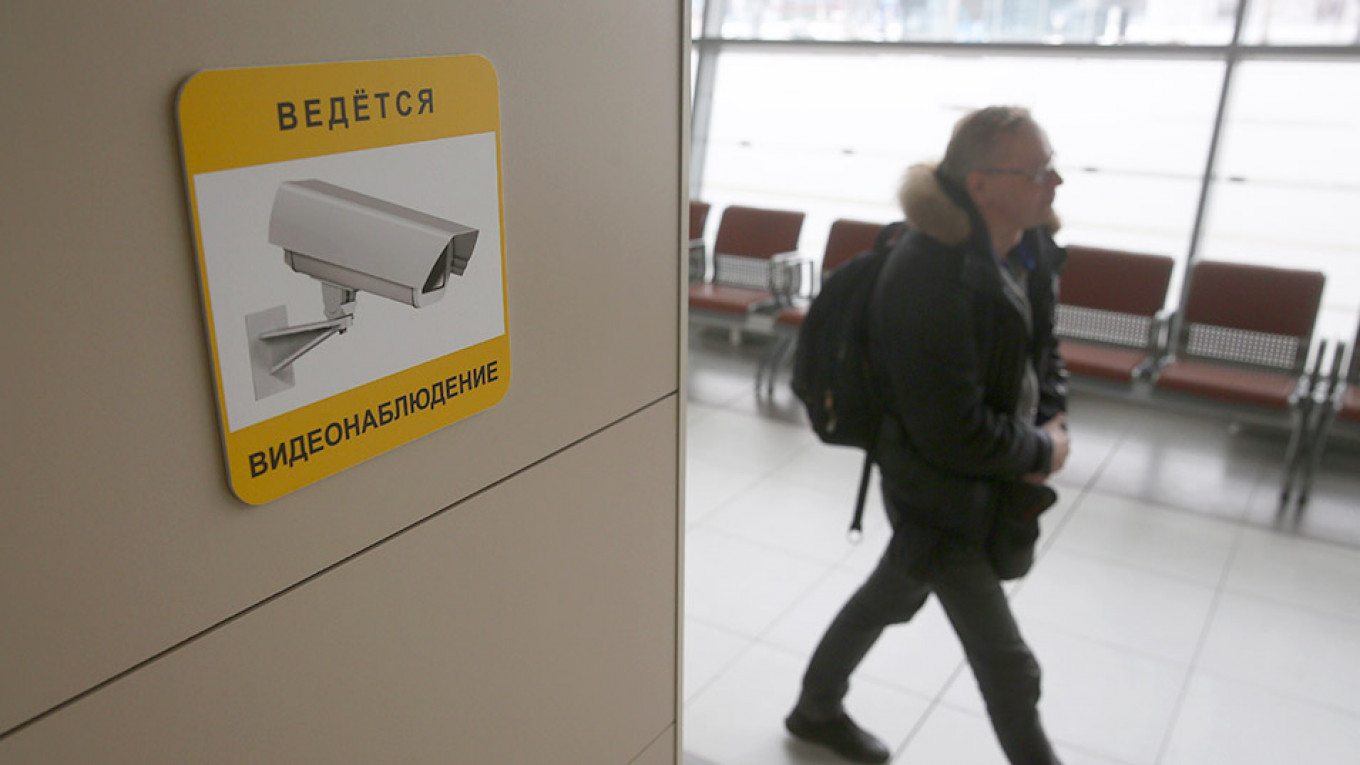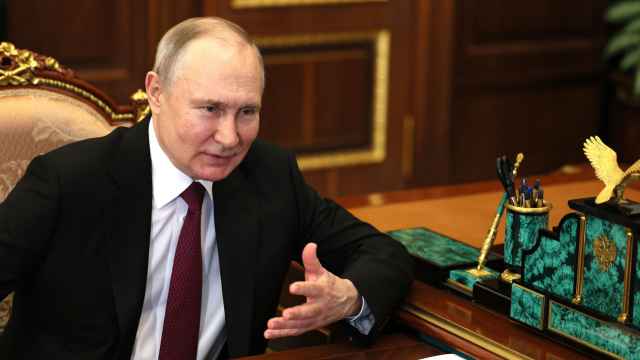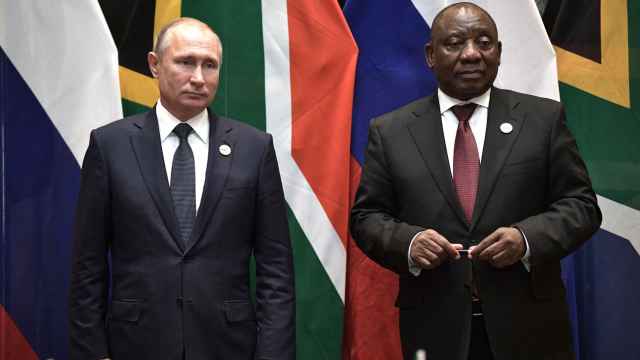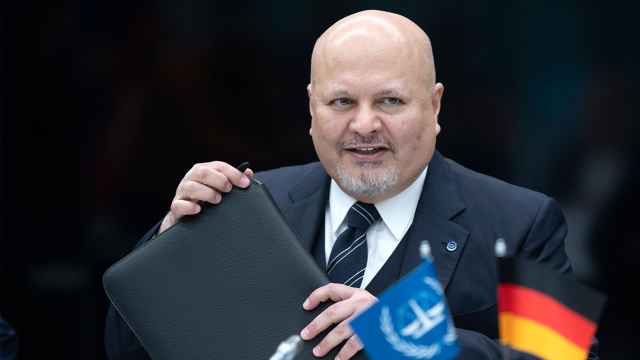The fourth of 10 basic rules Western spies followed when trying to infiltrate Russia’s capital during the Cold War — don’t look back because you’re never alone — is more apt than ever. Only these days it’s not just foreigners who are being tracked, but all 12.6 million Muscovites, too.
Officials in Moscow have spent the last few years methodically assembling one of the most comprehensive video-surveillance operations in the world. The public-private network of as many as 200,000 cameras records 1.5 billion hours of footage a year that can be accessed by 16,000 government employees, intelligence officers and law-enforcement personnel.
Now the entire system is about to be equipped with what City Hall is billing as some of the most advanced facial-recognition software outside of China, claiming it will be more accurate and easier to search than London’s older, bigger network. The upgrade will dramatically expand a pilot program that led to the capture of as many as 10 wanted criminals a month either at major public events or inside the city’s warren of 269 metro stations.
Moscow’s embrace of the technology, which the West is increasingly curtailing in response to public pressure, is being challenged in courts on political and legal grounds by opponents of President Vladimir Putin. But the monitoring tool is just one of several Russia is deploying, including mandatory recordings of all cellular calls. Many of the initiatives are based on recent advances in artificial intelligence, a science Putin sees as the ticket to global domination for whichever nation masters it first.
Putin and lieutenants led by Moscow Mayor Sergei Sobyanin say measures such as geolocating every active sim card in the country, creating “digital profiles” of each adult and collating online complaints against authorities are all necessary to ensure public safety and improve services. They’re betting most voters will accept further privacy curbs like the facial-recognition rollout in exchange for safer streets and greater convenience in their daily lives.
“We’re conducting experiments in schools, clinics, hospitals and in transport to introduce this technology, which, of course, will facilitate the work of a huge number of people and make these industries more efficient,” Sobyanin told Putin at a meeting on artificial intelligence earlier this year.
While so-called authoritarian tech, from automatic people trackers to online censorship bots, has triggered a worldwide debate about the proper balance between governing and surveilling, Moscow has so far made a better case for Big Brother than most cities. Russia’s capital ranks No. 1 among 40 metropolises in the latest UN survey of “e-government effectiveness in the delivery of public services.” London, by comparison, is fourth, Shanghai 11th and New York 14th.
Sobyanin, a former chief of Putin’s staff, is the co-head of a presidential commission set up this year to oversee the development of A.I. applications across Russia. His administration has been buying private information about smartphone users from commercial carriers for years as part of a push into big-data analytics by his Department of Information Technology.
The department, known as DIT, says the data is anonymized and used mainly to optimize transport routes and roadworks by studying how people walk, ride and drive. But it’s also developing more controversial — and presently illegal — uses for similar information. One can red-flag apartment owners who are probably not paying taxes on rental income, based on how few hours, if any, their phones ping from inside the property in question.
DIT is prohibited from activating the capability unless changes are made to current regulations and legislation regarding privacy. Russia does, though, have a lawful way to target everyone with a mobile phone — and it’s elevating concerns over potential civil-liberties infringements to a whole new level.
Russian cellular providers have started to record and store for a certain period of time every voice call made and text message sent on their platforms. The requirement is a result of a set of laws Putin signed in 2016 that resembles U.S. spying programs exposed in 2013 by whistle-blower Edward Snowden, who’s been living in self-imposed exile at an undisclosed location in Moscow ever since.
The recordings will form a vast new database that intelligence and law enforcement officials can trawl when searching for a person of interest, especially if he or she already has a voiceprint on file. More than 40,000 Russians have volunteered so far to have their faces and voices scanned as part of a biometrics campaign being championed by the government and leading state-run companies in technology and banking.
“The implementation of these Russian programs are consistent with the long-standing priorities of the security services to mitigate the perceived threat of free exchange of information and even movement,” said Keir Giles, a Russia specialist at the Conflict Studies Research Center in the U.K.
Russian authorities don’t deny that security is a driving force behind recent efforts to intensify their scrutiny of all forms of human activity, be it physical movements or communications via cyberspace and the airwaves. But they stress there’s an equally compelling economic motivation to capitalize on A.I.-related innovations, given that Russia remains largely isolated from the global financial system and overly dependent on natural resources.
State savings bank Sberbank PJSC and PJSC Rostelecom, the government-run internet provider that’s helping Russia build its own version of the Great Firewall of China, either control or partly own three of the country’s leading developers of facial-recognition and voice-identification systems.
These companies are already working with Moscow’s metro and supermarket chain Magnit PJSC on a biometric app that lets customers pay by simply looking at a camera. Now they’re leading the development of the new Digital Citizen initiative to unite all private data stored by various state bodies into a single, cloud-based directory overseen by Rostelecom.
More than 60 million Russians have several identifiers at the moment, a number that will exceed five dozen as more data from once-autonomous computer networks get “sucked” into the system, according to the Communications Ministry in Moscow. The additions will include employment, financial and driving histories, as well as insurance and familial status.
“Every department that stores basic records is now required to submit daily notifications of any changes to the Digital Profile System,” Deputy Minister Maxim Parshin said in an interview in Moscow. “This will eventually cut costs for everyone, from the government to the private sector.”
McKinsey & Company analyzed how “good” digital ID can be used in seven countries and determined that extending full coverage could “unlock economic value” equivalent to 3 to 13% of GDP by 2030. More than half of those benefits could accrue to individuals by easing access to banking, state benefits, education and other services while increasing transparency and efficiency for governments and businesses, the U.S.-based consulting firm found.
In Russia, more than 500 commercial organizations, including Sberbank, submit a combined 200,000 requests a day to the prototype of the Digital Profile System to verify information about existing clients and potential customers, Parshin said. It won’t be long before home buyers will be able to get a mortgage through biometric authentication alone.
Sberbank, headed by Herman Gref, the other co-chair of Putin’s A.I. board, is also among the banks providing biometric services that feed into the Digital Profile System. The support of Gref is vital to the success of the program because Sberbank serves as a payment agent for most household bills in addition to safeguarding almost half of the country’s savings.
Gref is fond of repeating the mantra “big data is the new oil,” but privacy experts say the concentration of so much personal information in a single database will make Russia an ideal target for identity thieves, not unlike Equifax Inc. The U.S. consumer-scorer was breached in 2017, exposing the credit histories of more than 145 million people. (Sberbank itself was the victim of a data leak affecting as many as 60 million clients, Kommersant reported this month. The bank said the incident impacted just 5,000 holders of its credit cards.)
Potentially more worrisome in a country routinely accused of harassing the political opposition is that the new database could be a precursor of the kind of “social credit” system China is developing. It’s a name-and-shame way to keep tabs on the behavior of the population by issuing grades, with demerits applied for things like smoking or circulating whatever’s deemed fake news.
But Sergey Sanovich, a scholar at Princeton University’s Center for Information Technology Policy, said Putin is much more concerned with keeping Russians happy than he is with trying to manipulate behavior on the scale China is attempting.
“One reason there isn’t more resistance is that the government’s digital services are quite well developed and certainly help people,” Sanovich said. “It’s one of the few areas where the government can showcase its competence and efficiency.”
This article first appeared in Bloomberg.
A Message from The Moscow Times:
Dear readers,
We are facing unprecedented challenges. Russia's Prosecutor General's Office has designated The Moscow Times as an "undesirable" organization, criminalizing our work and putting our staff at risk of prosecution. This follows our earlier unjust labeling as a "foreign agent."
These actions are direct attempts to silence independent journalism in Russia. The authorities claim our work "discredits the decisions of the Russian leadership." We see things differently: we strive to provide accurate, unbiased reporting on Russia.
We, the journalists of The Moscow Times, refuse to be silenced. But to continue our work, we need your help.
Your support, no matter how small, makes a world of difference. If you can, please support us monthly starting from just $2. It's quick to set up, and every contribution makes a significant impact.
By supporting The Moscow Times, you're defending open, independent journalism in the face of repression. Thank you for standing with us.
Remind me later.






